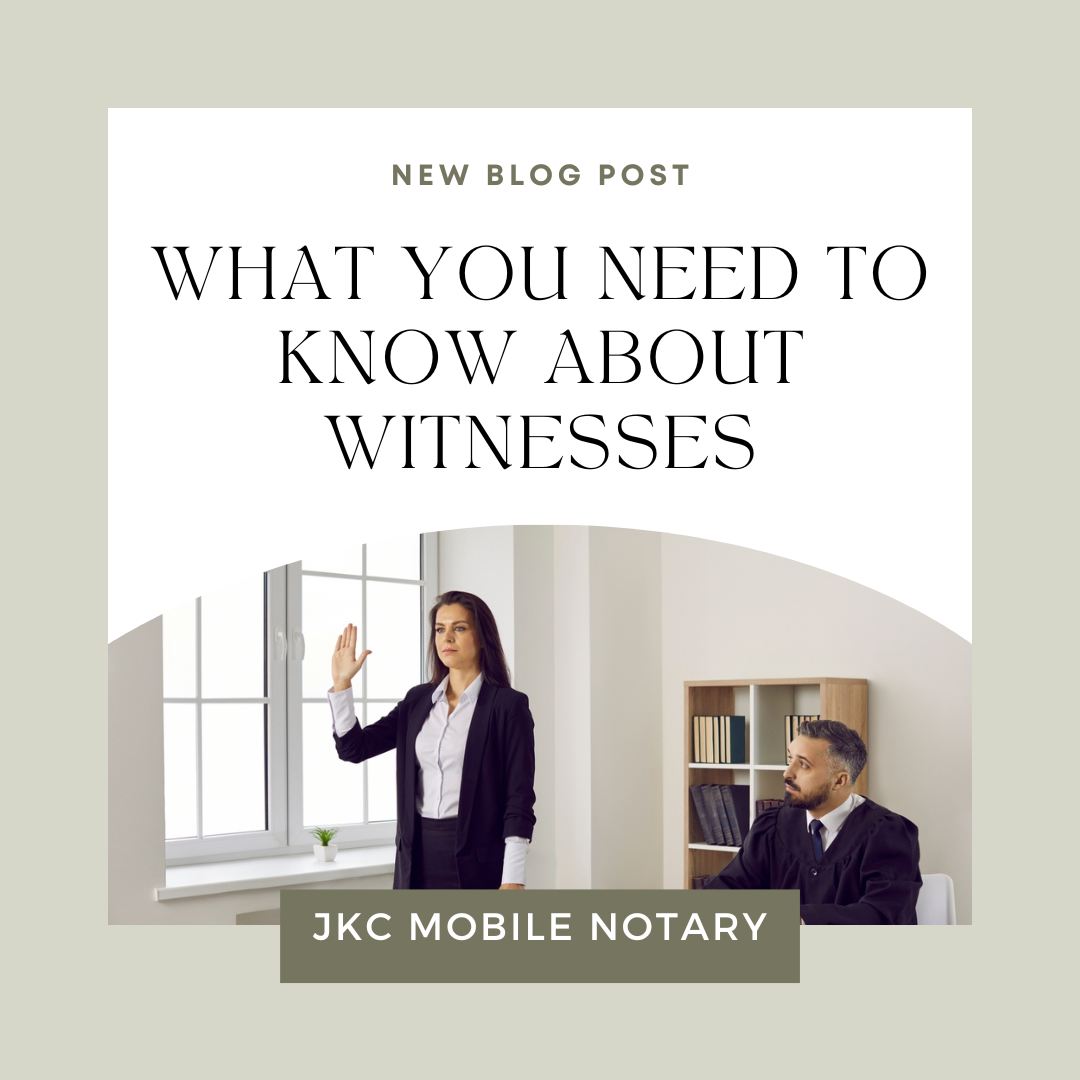What You Need To Know About Witnesses
Before being a notary public, whenever I heard the word WITNESS, I always attributed it to a witness in a crime or courtroom. How my view and understanding of that word has changed. Understanding the use, need, and variety of witnesses as a Notary is vital to comply with our state laws when performing notarizations. Today I will give you an overview of the witnesses, their roles, and when you need them.
First, let's list the types of witnesses we will encounter who will be required when notarizing our documents.
Credible Identifying Witness
Subscribing Witness
Signature Witness
Document Witness
Signature by Mark Witness
Ok, we've got our list. Let's get into the who, why, when, and how. To ensure I am giving you the correct information no matter where you are located, I am using some images and information from the NNA, the National Notary Association. Check out my blog post here if you’ve never heard of them. It will give you a great look at this amazing resource for Notaries nationwide.
Credible Identifying Witness:
These witnesses are used in place of valid ID for the signer. They are human ID cards. These witnesses must know the signer to act as a Credible Witnesses. You may be able to use one Credible Witness if that witness knows both you (the notary) and the signer.
If no Credible Witness knows the notary, you must use two Credible Witnesses. These witnesses must show you their ID and possibly sign your journal. In California, they do, but I need to figure out other states. Check your state's statutes for clarification.
In California, Florida, Nebraska, and North Carolina, Credible Witnesses can not benefit from the document that is being signed. That means whatever this document is doing, it could be a Will, a Power of Attorney, a Property Sale, or a Purchase Agreement. If any of the Credible Witnesses have the potential to benefit from the transaction, they can’t be Credible Witnesses.
Subscribing Witness:
A Subscribing Witness is a witness who watches the signer signing the document and then meets with the Notary in the signer's place. I wrote an entire blog post about this. You can check that out here. It can be complicated, but once you understand the parameters, you can offer it to your clients.
To be a Subscribing Witness, the witness must have been present at the time of signing the document, or the signer must acknowledge their signature to the witness.
Some states don’t allow certain documents to be notarized via Subscribing Witness. The NNA has more information; you can check it out here.
Signature Witness:
To give you an overview of this type of Notarial act, I am going straight to the NNA:
“A signature witnessing is a type of notarial act authorized in many states, including Colorado and Pennsylvania. To perform a signature witnessing, the Notary must have the signer personally appear and provide satisfactory proof of identity. The signer must then sign the document in the Notary’s presence, and the Notary then completes the appropriate notarial wording.
It is very important to be aware that a signature witnessing is NOT the same as an acknowledgment or jurat, though the acts are similar in some aspects. A signature witnessing differs from an acknowledgment in that it requires the document to be signed in the Notary’s presence. A signature witnessing is also different from a jurat because while both acts require the document to be signed in the Notary’s presence, a signature witnessing does not require the Notary to administer an oath or affirmation to the signer. Not all states authorize their Notaries to perform signature witnessings. For more information, please see the article and video “3 Differences Between Acknowledgments And Signature Witnessings.” - NNA Different Types of Witnesses.
Document Witness:
A Document Witness is when a Notary or a person is asked to witness the signing of a document. This is not a Notarial act, so if, as a notary, you are asked and are allowed (by your state's guidelines) to witness a document signing, you will be doing so not as a Notary but as a private individual.
In some states, you can both act as a witness and notarize a document; however, this is only allowed in some states. Some restrict what types of documents you witness and notarize in the states where it's allowed. Read more about that here.
Signature by Mark Witness:
The notarial act of Signature by Mark is used when a signer is unable or unwilling to sign their name to a document. In many states, this act requires one or two witnesses. The witnesses will witness the signer signing by mark, and one of them will write the signer's name next to their mark, both on the document and the journal. Every state has different rules about this and who can be witnesses in this situation. Please check out the NNA and get into your Notary handbook or statutes to understand this notarial act better.
There you go. An overview of what you should know about Witnesses. Did you find this information helpful? Do you have something you’d like to add? I would love to hear from you in the comments.
Until Next Week-
Jennifer K. Cooper, JKC Mobile Notary






